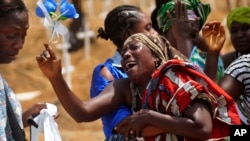The United Nations Children’s Fund warns the Ebola epidemic will continue to devastate the lives of children and their communities in Liberia, Sierra Leone and Guinea as long as one case of this deadly disease remains. UNICEF is urging swift, effective action to bring the number of Ebola cases down to zero.
The three presidents of Liberia, Sierra Leone and Guinea have set April 15 as the goal for reaching zero cases of Ebola. The UNICEF representative in Sierra Leone, Roeland Monasch, tells VOA it is hard to predict whether this wished for goal will be reached.
“Every day I look at my e-mails at the end of the day to look at the score," said Monasch. "And, every day I pray it is zero; but, every day, unfortunately it is not ...We call it a bumpy road to zero. It is going up and it is going down. We see days when we have 20 to 25 cases. We see days when we have two or three cases.”
The World Health Organization reports nearly 24,600 cases of Ebola, including 10,144 deaths in the three West African countries. The U.N. Children’s Fund reports 20 percent of these infections are among children. In addition, the agency notes more than 16,000 children have lost one or both parents to this disease.
Monasch says children also remain vulnerable to other killer diseases. He says Sierra Leone has the highest under five mortality rate in the world and this has risen in the last nine to 12 months because of Ebola.
The UNICEF representative says it is crucial to start building better basic health facilities so children can access non-Ebola health services, which have broken down during the course of the epidemic.
“Children are dying from very easily preventable diseases like malaria, diarrhoea, pneumonia," said Monasch. "And, as UNICEF we have been working very closely with the Ministries of Health to make sure that there are health workers, to make sure that there are medicines in place; but, unfortunately, people are so afraid to come to the clinics to be identified to be an Ebola patient or to get infected by Ebola that children are dying at home of preventable diseases.”
UNICEF says the outbreak will not be over until there are zero cases of Ebola. To get there, it says every single contact has to be traced and monitored to make sure no hidden cases remain.
The agency warns against the enormous risk of complacency. It says people must not let down their guard because they believe the epidemic is over and revert to behavior that could again spread the disease. UNICEF says communities must continue to conduct safe burials and households where Ebola is detected must be quarantined.




